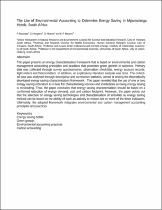 ResearchSpace
ResearchSpace
The use of environmental accounting to determine energy saving in Mpumalanga Hotels, South Africa
JavaScript is disabled for your browser. Some features of this site may not work without it.
- ResearchSpace
- →
- Research Publications/Outputs
- →
- Journal Articles
- →
- View Item
| dc.contributor.author |
Machete, Fannie

|
|
| dc.contributor.author |
Hongoro, C

|
|
| dc.contributor.author |
Nhamo, G

|
|
| dc.contributor.author |
Mearns, KF

|
|
| dc.date.accessioned | 2017-09-22T10:22:23Z | |
| dc.date.available | 2017-09-22T10:22:23Z | |
| dc.date.issued | 2016-12 | |
| dc.identifier.citation | Machete, F., Hongoro, C., Nhamo, G. et al. 2016. The use of environmental accounting to determine energy saving in Mpumalanga Hotels, South Africa. Journal of Environmental Accounting and Management, vol. 4(4): 413-422. | en_US |
| dc.identifier.issn | 2325-6192 | |
| dc.identifier.uri | https://www.researchgate.net/publication/312218763_The_Use_of_Environmental_Accounting_to_Determine_Energy_Saving_in_Mpumalanga_Hotels_South_Africa | |
| dc.identifier.uri | https://lhscientificpublishing.com/Account/Login.aspx | |
| dc.identifier.uri | http://hdl.handle.net/10204/9590 | |
| dc.description | Journal of Environmental Accounting and Management, vol. 4(4): 413-422. This is a postprint version of the published item. For access to the published version, kindly contact the publishers. | en_US |
| dc.description.abstract | This paper presents an energy characterisation framework that is based on environmental and carbon management accounting principles and practices that promotes green growth in societies. Primary data was collected through survey questionnaires, observation checklists, energy account records, light meters and thermometers. In addition, an exploratory literature analysis was done. The collect-ed data was analysed through descriptive and correlation statistics, aimed at testing the theoretically developed energy saving characterisation framework. The paper revealed that the use of one or two energy saving indicators as a base for characterising services and institutions as being energy saving is misleading. Thus, the paper concludes that energy saving characterisation should be based on a confirmed reduction of energy demand, cost and carbon footprint. However, the paper points out that the selection of energy saving technologies and characterisation of activities as energy saving method can be based on the ability of such an activity to reduce one or more of the three indicators. Ultimately, the adopted framework integrates environmental and carbon management accounting principles and practices. | en_US |
| dc.language.iso | en | en_US |
| dc.publisher | L&H Scientific Publishing | en_US |
| dc.relation.ispartofseries | Worklist;18195 | |
| dc.subject | Energy saving hotels | en_US |
| dc.subject | Green growth | en_US |
| dc.subject | Environmental accounting practices | en_US |
| dc.subject | Carbon accounting | en_US |
| dc.title | The use of environmental accounting to determine energy saving in Mpumalanga Hotels, South Africa | en_US |
| dc.type | Article | en_US |
| dc.identifier.apacitation | Machete, F., Hongoro, C., Nhamo, G., & Mearns, K. (2016). The use of environmental accounting to determine energy saving in Mpumalanga Hotels, South Africa. http://hdl.handle.net/10204/9590 | en_ZA |
| dc.identifier.chicagocitation | Machete, Fannie, C Hongoro, G Nhamo, and KF Mearns "The use of environmental accounting to determine energy saving in Mpumalanga Hotels, South Africa." (2016) http://hdl.handle.net/10204/9590 | en_ZA |
| dc.identifier.vancouvercitation | Machete F, Hongoro C, Nhamo G, Mearns K. The use of environmental accounting to determine energy saving in Mpumalanga Hotels, South Africa. 2016; http://hdl.handle.net/10204/9590. | en_ZA |
| dc.identifier.ris | TY - Article AU - Machete, Fannie AU - Hongoro, C AU - Nhamo, G AU - Mearns, KF AB - This paper presents an energy characterisation framework that is based on environmental and carbon management accounting principles and practices that promotes green growth in societies. Primary data was collected through survey questionnaires, observation checklists, energy account records, light meters and thermometers. In addition, an exploratory literature analysis was done. The collect-ed data was analysed through descriptive and correlation statistics, aimed at testing the theoretically developed energy saving characterisation framework. The paper revealed that the use of one or two energy saving indicators as a base for characterising services and institutions as being energy saving is misleading. Thus, the paper concludes that energy saving characterisation should be based on a confirmed reduction of energy demand, cost and carbon footprint. However, the paper points out that the selection of energy saving technologies and characterisation of activities as energy saving method can be based on the ability of such an activity to reduce one or more of the three indicators. Ultimately, the adopted framework integrates environmental and carbon management accounting principles and practices. DA - 2016-12 DB - ResearchSpace DP - CSIR KW - Energy saving hotels KW - Green growth KW - Environmental accounting practices KW - Carbon accounting LK - https://researchspace.csir.co.za PY - 2016 SM - 2325-6192 T1 - The use of environmental accounting to determine energy saving in Mpumalanga Hotels, South Africa TI - The use of environmental accounting to determine energy saving in Mpumalanga Hotels, South Africa UR - http://hdl.handle.net/10204/9590 ER - | en_ZA |





